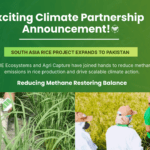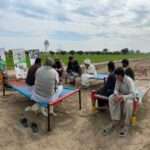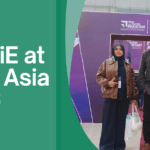News
Green Fashion: Transforming Cotton Farming for a Sustainable Future
Cotton is a cornerstone of the global textile industry, providing the raw material for countless products we use daily. However, its cultivation and processing come at a significant environmental and social cost. From excessive water usage and high use of chemicals & pesticides to high carbon emissions and the exploitation of farmers, the cotton industry is one of the largest resource consumers and polluters in the world.

Top News
In response to these challenges, SAWiE is revolutionizing the cotton farming landscape with its Regenerative Agriculture Cotton clusters promoting “Green Fashion”. By tackling key issues such as water efficiency, chemical use, and farmer livelihoods, SAWiE is fostering sustainable practices that benefit farmers, the environment, and the fashion industry alike. Through cutting-edge technology use of satellites, Machine learning, and AI, advanced early warning systems, alerts, and innovative partnerships, SAWiE is creating a blueprint for a more ethical and sustainable cotton industry.
Global Cotton Industry Challenges:
- Water Usage: Producing one kilogram of cotton fiber consumes approximately 20,000 liters of water. This translates to about 6000 liters per t-shirt, contributing to severe pressure in water-stressed regions.
- Pesticides and Fertilizers: Cotton accounts for 16% of the world’s pesticide use, despite covering only 2.5% of cultivated land. These chemicals degrade soil health, pollute water bodies, and threaten farmer health.
- Carbon Emissions: The textile industry contributes approximately 10% of global carbon emissions, driven by unsustainable practices in cotton farming and apparel manufacturing.
- Farmer Poverty: About 70% of the world’s cotton farmers live in poverty, with income instability caused by fluctuating global cotton prices.
SAWiE’s Transformative Interventions:
Water Efficiency:
- By deploying AI-powered models and satellite data, SAWiE has helped farmers optimize irrigation, reducing water wastage by up to 30%.
- Promotes drip irrigation, improving water-use efficiency by 40-50% compared to traditional methods.
Regenerative Agriculture Practices:
- Promote Regenerative agriculture practices to improve soil health, and increase soil carbon.
- Integrate livestock parts of cotton with other staple crops including wheat and legumes.
- Encourages the use of organic fertilizers and biopesticides, which have reduced chemical dependency in pilot regions by 25%
- Restores soil health and enhances biodiversity, improving resilience against climate variability.
- Empower gender especially women and youth to earn decent wages
Sustainable Cotton in Fashion:
- Sustainable cotton farming methods advocated by SAWiE have helped to reduce greenhouse gas emissions by up to 40% in Bahawalpur RACC
- Enables traceability in the supply chain, connecting farmers to premium markets willing to pay a 15-20% price premium for sustainable cotton.
SAWiE’s Impact on Cotton Farmers:
- Higher Yields: Farmers employing SAWiE’s methods in Pakistan have achieved a 20% increase in yield through better soil health, crop health, and water management.
- Economic Benefits: Reduced input costs (pesticides and water) and higher crop prices have improved farmer incomes by up to 25%.
- Environmental Gains: Sustainable practices have led to a 10% improvement in soil organic matter, contributing to long-term ecosystem health.
“I’m really glad to be part of the Regenerative Agriculture Cotton Cluster,” says Mr. Muhammad Aslam, a farmer from Noorpur Noranga, Bahawalpur. “The SAWiE teams supported me from the start of the cotton season with soil testing, selecting the right cotton varieties, and implementing sowing methods on raised beds. This year, I saved 30% of water, which meant using two fewer irrigations than usual. I also saved nearly 25% on fertilizers and crop chemical sprays. Their teams carried out regular crop inspections and provided daily and weekly weather forecasts. Despite the challenges of climate change, I harvested 45 maunds of cotton this year—20% more yield—and secured better crop prices.”
Dr. Tasneem Khaliq, Director of Regenerative Agriculture at SAWiE, highlighted the importance of these results, “We are glad to see the impact of our farm advisory services in helping farmers reduce the risk of crop failure by adopting climate-smart agricultural practices. This transformation not only boosts yields but also ensures long-term sustainability and resilience for farmers like Mr. Aslam. Next year we plan to expand 2-3 more clusters in Punjab, Sindh, and Baluchistan. We look forward to working with the textile industry to fulfill the dream of green and sustainable fashion and enhance the country’s exports.



